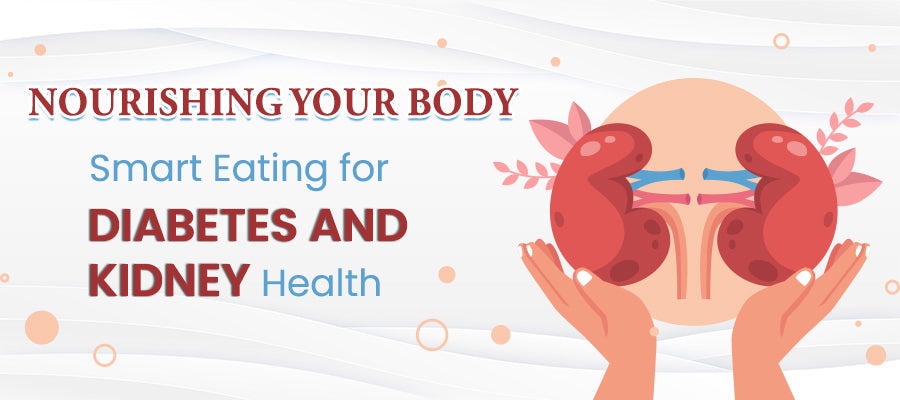Did you know that diabetes is the leading cause of kidney disease? In fact, many people who live with diabetes eventually face kidney-related issues—often without even realizing it in the early stages. Managing both conditions together can feel overwhelming, but the right food choices can truly make a difference.
If you or a loved one has been diagnosed with both conditions, this guide will help you understand the diet for kidney disease and diabetes, including what to eat, what to avoid, and how to create a meal plan that supports both your kidneys and your blood sugar levels.
Let’s break it down simply.
Why Your Diet Matters When Managing Both Conditions
When you have both diabetes and kidney disease, your food needs change. You not only need to manage blood sugar levels but also reduce the strain on your kidneys. This means being more mindful about your carbohydrates, protein, sodium, potassium, and fluid intake.
It’s a balancing act—but with the right choices, it’s completely doable.
Safe and Nourishing Foods to Include
Here’s what you can include in your daily meals to feel full, nourished, and in control of your health.
1. Safe & Kidney-Friendly Carbs
Not all carbs are off-limits! You just need to choose wisely and control portions.
- Low GI Millets: Like little millet, foxtail millet, and barnyard millet are great alternatives to white rice and wheat. They provide slow energy release, keeping your sugar stable while being gentle on your kidneys.
- Vegetables: Such as bottle gourd, ridge gourd, snake gourd, pumpkin, cauliflower, and cabbage are easy to digest and low in potassium.
- Fruits: Like apple, pear, berries, and guava can be enjoyed in moderation—just keep an eye on your potassium levels with your doctor’s advice.
2. Plant-Based Proteins
Protein is essential, but too much can strain the kidneys. Choose gentle options:
- Boiled moong dal (small amounts)
- Paneer in moderation
- Soaked and rinsed dals or sprouts, also in limited quantities
Always check with your doctor or dietitian on the best portion sizes for your condition.
3. Healthy Fats
Good fats support energy and hormone health, even with kidney disease.
- Add a spoon of A2 cow ghee
- Use cold-pressed sesame oil or mustard oil for cooking
- Add flaxseed oil as a garnish or salad dressing—it’s rich in omega 3, 6, and 9 and especially valuable for vegetarians who may lack these essential fats.
4. Fluids That Soothe and Support
Stay hydrated—but avoid too much fluid if you’ve been advised to restrict intake.
- Coconut water (only if your potassium is in the safe range)
- Herbal teas like coriander seed tea or tulsi tea
- Infused water with cumin , coriander or fennel great for digestion and reducing bloating
5. Low-Sodium Spices & Herbs
Spices add flavor without adding salt.
- Use turmeric, coriander, cumin, cinnamon, ajwain, and (if not restricted)
- Avoid packaged masalas and MSG-based seasonings
Foods to Limit or Avoid
Here’s what’s best to avoid to protect your kidneys and sugar levels:
- High potassium foods: Bananas, Potatoes, Tomatoes, Oranges
- High phosphorus foods: Packaged foods, and most Dairy
- White carbs: White rice, Maida (refined flour), Sugary items.
- Processed snacks and fried or bakery items
- Artificial sweeteners: They may not raise sugar levels, but they irritate the gut and disrupt digestion. Instead, choose stevia or monk fruit if needed.
7-Day Meal Plan for Kidney Disease and Diabetes
Creating a meal plan is key to consistency and results. Here’s a sample 7-day meal plan for kidney disease and diabetes using safe foods:
| Day | Breakfast | Lunch | Dinner |
|---|---|---|---|
| Mon | Little millet upma | Moong dal + pumpkin sabzi + barnyard millet | Mixed veg khichdi (no tomato/spinach) |
| Tue | Chia pudding with berries | cabbage curry + millet roti | Light ridge gourd soup + roti |
| Wed | Sprouted moong salad | Lauki sabzi + millet roti | Foxtail millet khichdi + curd |
| Thu | Methi dal chilla | Snake gourd curry + rice + paneer | Veg soup + millet roti |
| Fri | Coconut water + low-GI fruit | Cauliflower sabzi + dal + millet | Moong dal khichdi + salad |
| Sat | Besan cheela with mint chutney | Tinda curry + millet roti | Veg stew with bottle gourd |
| Sun | Ragi porridge (light) | Mixed veggie pulao + sprout salad | Ridge gourd soup + roti |
Note: Always adjust based on your specific lab reports (especially potassium and creatinine levels).
General Guidelines to Remember
- Eat balanced 3 meals a day – Frequent snacking or many small meals can cause repeated sugar spikes.
- Use salt wisely – Watch food labels and keep sodium low to protect kidneys.
- Protein intake should be based on your body weight – For example, a 50 kg person should aim for about 50g protein/day. Don’t overdo it.
- Track your sugar and creatinine levels regularly – It helps you and your doctor personalize your diet.
- Stay active – Include walking, yoga, or any gentle movement in your day.
- Get quality sleep – Proper rest for 7 to 8 hrs support kidney repair and boost overall energy.
Final Thoughts
Following the right diet for kidney disease and diabetes may seem tricky at first, but with small, consistent changes, it becomes second nature. Choosing the right foods, staying hydrated, and keeping your meals simple and nourishing can truly support your body.
Don’t be afraid to experiment with different millet-based recipes, herbal teas, and light meals. Always consult your healthcare provider to customize your diet as per your health needs.
Remember, food is not just fuel—it’s medicine when chosen wisely.





















